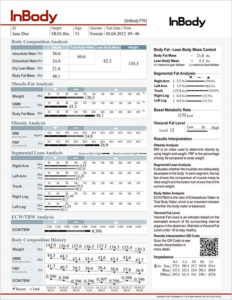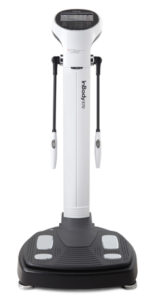Body Fat Testing
Scale weight is a pretty useless number when you think about it. All it tells you is the force with which gravity pulls down on you. However, the InBody 570 scale measures body fat, muscle mass, water, and basal metabolic rate (how many calories your body burns at rest), among other measurements.
If you are in any way serious about managing your weight and improving your quality of life, you should know your body composition. Without knowing what you’re actually made of, you can only guess at how much muscle and fat you actually have.
Body composition also gives you a new way to think about and approach your weight. It provides way more useful information than relying solely on Body Mass Index (BMI) – the traditional way to determine if you are at a healthy weight. BMI is simply a number that represents your weight relative to your height. But if you are even a little bit athletic, or if you lead a fairly sedentary lifestyle, BMI can be misleading.
Think about athletes, who tend to have high BMIs, but low body fat percentages. Or a desk-bound office employee at a healthy BMI who eats well. Sedentary adults working in offices who do not exercise are known to lose muscle mass, especially in their legs. This leads to a drop in weight in muscle mass, but fat remains. This can lead to high body fat percentages, even in individuals with “normal” weights and BMIs. Ever heard of being skinny fat?
Body composition analysis can also be a useful tool to motivate you as we work together. Clients might think they’re not making much progress, when in reality, there are a lot of metabolic changes happening.

How often should body fat testing be done?
Testing is recommended every 2-4 weeks under the same conditions to accurately track your progress. That includes the same time of day.
How do I prepare for my test?
In order to have the most accurate measurements, these guidelines should be followed:
- Must have access to bare feet, so please no tights or pantyhose.
- Do not exercise, eat, or drink 4 hours prior to your test.
- Hydrate well the day before.
- Do not drink caffeine on the day of your test.
- Do not consume alcohol for 24 hours prior to testing.
- Do not wear jewelry – all jewelry will have to be removed prior to testing.
- Do not use the InBody after a shower or sauna session.
- Empty your bladder just before your test.
- It is optimal, though not required, that women be measured while not having their period, as total body water will be higher than normal.
Do not use the InBody if you have a pacemaker or other electronic medical device implanted, or are pregnant. Know that metal implants may skew fat free mass result and cosmetic implants may skew fat mass/PBF result, but any skewed results will be consistent from test to test.




